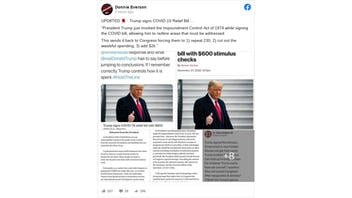
Did President Trump invoke the Impoundment Control Act of 1974 as he signed the Covid-19 Relief Bill, forcing Congress to rescind section 230, cut wasteful spending, and to add $2,000 stimulus checks for all Americans? No, that's not true: The Impoundment Control Act does not force Congress to do anything. It was passed in 1974 as a way to limit the president's power to withhold the spending of funds approved by Congress in a budget bill. Congress can pass a bill within 45 days agreeing with the president's requested spending rescissions, or it can just ignore them.
The claims appeared on social media hours after Trump backed down from his veto threat of the omnibus spending bill, which included the Covid-19 relief package, on December 27, 2020, including in a post (archived here) titled "UPD8TED ![]() : Trump signs COVID-19 Relief Bill ...". It read:
: Trump signs COVID-19 Relief Bill ...". It read:
"President Trump just invoked the Impoundment Control Act of 1974 while signing the COVID bill, allowing him to redline areas that must be addressed.
This sends it back to Congress forcing them to 1) repeal 230, 2) cut out the wasteful spending, 3) add $2k."
This is what the post looked like on Facebook at the time of writing:
(Source: Facebook screenshot taken on Mon Dec 28 05:43:13 2020 UTC)
The claims appear intended to frame Trump's decision to drop his announced plan to veto the massive spending measure as a victory for the president. Trump did redline some spending items in the bill, but these rescissions must be approved by Congress within 45 days to take effect. If Congress chooses to ignore them, they remain in the budget.
The claim that invoking the ICA forces Congress to "repeal 230" is an apparent reference to the president's effort to punish Facebook and other social platforms by repealing Section 230 of the Communications Decency Act. That provision protects online social media from being sued as publishers for content posted on their platforms by third parties in many cases. Nothing in the ICA forces Congress to repeal that.
It's the same case with the claim that invoking the ICA forces Congress to raise the stimulus checks to $2,000. However, Speaker Nancy Pelosi is already pushing a separate bill to do that.
The Impoundment Control Act was passed in 1974 as a counter to President Richard Nixon's attempts to withhold specific items from the federal budget that had been passed by Congress, according to the House Budget Committee's website:
Congress passed the ICA in response to President Nixon's executive overreach - his Administration refused to release Congressionally appropriated funds for certain programs he opposed. While the U.S. Constitution broadly grants Congress the power of the purse, the President - through the White House Office of Management and Budget (OMB) and executive agencies - is responsible for the actual spending of funds. The ICA created a process the President must follow if he or she seeks to delay or cancel funding that Congress has provided.
In other words, the ICA is not a tool for a president to force Congress to take any action.
The White House issued a statement after the signing that claimed Congress had agreed to make the changes, but there is no confirmation from congressional leaders to such an agreement:
On Monday the House will vote to increase payments to individuals from $600 to $2,000. Therefore, a family of four would receive $5,200. Additionally, Congress has promised that Section 230, which so unfairly benefits Big Tech at the expense of the American people, will be reviewed and either be terminated or substantially reformed.
Likewise, the House and Senate have agreed to focus strongly on the very substantial voter fraud which took place in the November 3 Presidential election.The Senate will start the process for a vote that increases checks to $2,000, repeals Section 230, and starts an investigation into voter fraud.
Big Tech must not get protections of Section 230!
Voter Fraud must be fixed!


















